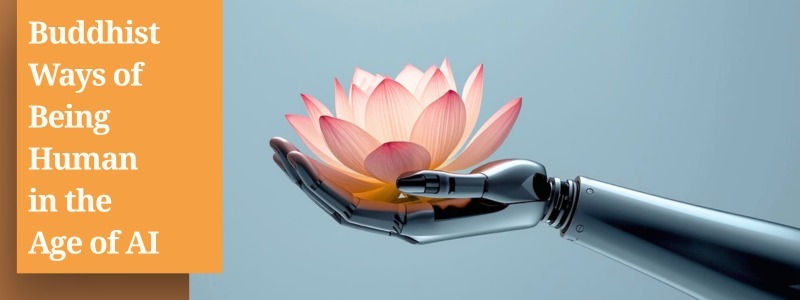

Buddhist Ways of Being Human in the Age of AI: Academic Summer Course
What can Buddhist approaches to being human and maximizing human potential teach humanity as it confronts the unprecedented identity crisis of artificial intelligence? Over the course of 2500 years, Buddhist traditions have often embraced technological innovations in the service of expanding the scope of what it means to be human. This course explores Buddhism as a resource for addressing challenges posed by emergent AI technologies to the boundaries of human intelligence and capability.
Course Practicalities
To be announced soon
Get to know the teachers
Prof. John Dunne
John Dunne holds the Distinguished Chair in Contemplative Humanities, an endowed position in the Center for Healthy Minds at the University of Wisconsin-Madison, where he also serves as tenured faculty in the Department of Asian Languages and Cultures.John’s publications appear in venues ranging across both the Humanities and the Sciences, and they include works on Buddhist philosophy, contemplative practice and their interpretation within scientific, philosophical and cultural contexts. In addition to research and publications, John has played an active role in academic leadership, including service as a senior advisor for the Rangjung Yeshe Institute in Kathmandu. John teaches often at Gomde Germany-Austria, especially for the academic summer courses.
Dr Ana C. Lopes
John Dunne holds the Distinguished Chair in Contemplative Humanities, an endowed position in the Center for Healthy Minds at the University of Wisconsin-Madison, where he also serves as tenured faculty in the Department of Asian Languages and Cultures.John’s publications appear in venues ranging across both the Humanities and the Sciences, and they include works on Buddhist philosophy, contemplative practice and their interpretation within scientific, philosophical and cultural contexts. In addition to research and publications, John has played an active role in academic leadership, including service as a senior advisor for the Rangjung Yeshe Institute in Kathmandu. John teaches often at Gomde Germany-Austria, especially for the academic summer courses.
Asst. Prof. James Gentry
John Dunne holds the Distinguished Chair in Contemplative Humanities, an endowed position in the Center for Healthy Minds at the University of Wisconsin-Madison, where he also serves as tenured faculty in the Department of Asian Languages and Cultures.John’s publications appear in venues ranging across both the Humanities and the Sciences, and they include works on Buddhist philosophy, contemplative practice and their interpretation within scientific, philosophical and cultural contexts. In addition to research and publications, John has played an active role in academic leadership, including service as a senior advisor for the Rangjung Yeshe Institute in Kathmandu. John teaches often at Gomde Germany-Austria, especially for the academic summer courses.
James Gentry is Assistant Professor of Religious Studies at Stanford University. He received his PhD in Religious Studies from Harvard University with a specialization in the history and literature of Buddhism.
James’s work centers on how textual culture, material culture, and contemplative and ritual practices intersect in the formation and transformation of tantric Buddhist traditions in Tibet. He is the author of Power Objects in Tibetan Buddhism: The Life, Writings, and Legacy of Sokdokpa Lodrö Gyeltsen (Brill, 2017), which examines the roles of tantric material and sensory objects in the lives and institutions of Tibetan and Himalayan Buddhists. He is also the author of The Bodhisattva’s Body in a Pill (forthcoming from University of Virginia Press), which traces the history of the maṇi pill, one of Tibet’s most popular and enduring Buddhist relic traditions, from its precedents in the 8th and 9th centuries to the present period as a lens into the broader history of tantra in Tibet at the nexus of ritual and medicine. James has taught at the University of Virginia and the Centre for Buddhist Studies at Rangjung Yeshe Institute, Kathmandu University, Nepal. He has also served as editor-in-chief of the project 84000: Translating the Words of the Buddha, which aims to commission English translations of the Buddhist sūtras, tantras, and commentaries preserved in Tibetan translation and publish them in an online open-access forum (http://84000.co).